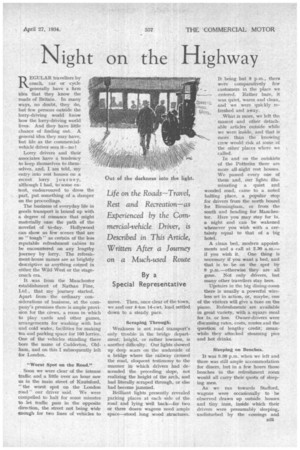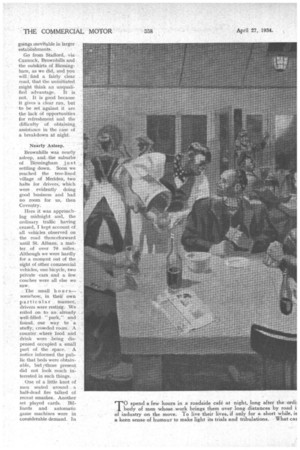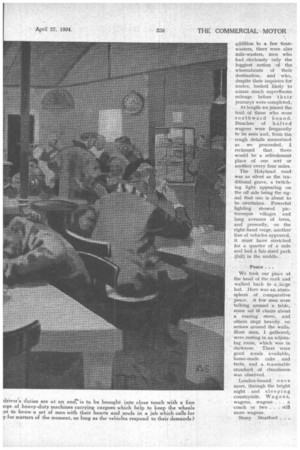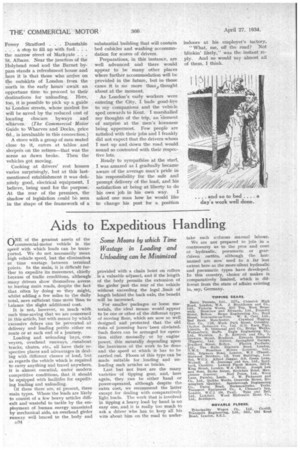N ight
Page 97

Page 98

Page 99

Page 100

If you've noticed an error in this article please click here to report it so we can fix it.
on the Highway
By a Special Representative
RE'GULAR travellers by coach, car or cycle generally have a firm idea that they know the roads of Britain. In many ways, no doubt, they do, but •few persons outside the lorry-driving world know how the lorry-driving world lives. And they have little chance of finding out. A general idea they may have, but life as the commercialvehicle driver sees it—no!
Lorry drivers and their associates have a tendency to keep themselves to themselves, and, I am told, my entry into rest houses on a recent lorry, journey, although I had, to sonic extent, endeavoured to dress the part, put something of a damper on the proceedings.
The business of everyday life in goods transport is bound up with a degree of romance that might materially ease the path of the novelist of to-day. Hollywood can show us few scenes that are so " tough" as certain of the less reputable refreshment cabins to be encountered on any lengthy journey by lorry. The refreshment-house names are as brightly descriptive as anything coined in either the Wild West or the stagecoach era.
It •was from the Manchester establishment of Nathan Fine, Lid., that my journey started. Apart from the ordinary considerations of business, at the company's premises there is ample provision for the crews, a room in which to play cards and other games, arrangements for washing with hot and cold water, facilities for making tea and parking space for 100 lorries. One of the vehicles standing there bore the name of Cadderton, Oldham, and on this I subsequently left for London.
"Worst Spot on the Road."
Soon we were clear of the intense traffic and a little over an hour saw us in the main street of Knutsford, "the worst spot on the London road" our driver said. We were compelled to halt for some minutes to let traffic pass in the opposite direction, the street not being wide enough for two lines of vehicles to
move. Then, once clear of the town, we and our 4-ton 14-cwt. load settled down to a steady pace.
Scraping Through.
Weakness is not road transport's only trouble in the bridge department; height, or rather lowness, is another difficulty. Our lights showed up deep scars on the underside of a bridge where the railway crossed the road, eloquent testimony to the manner in which drivers had ' descended the preceding slope, not realizing the height of the arch, and had literally scraped through, or else had become jammed.
Brilliant lights presently revealed parking places at each side of the road and lying well back—for two or three dozen wagons need ample space—stood long wood structures.
It .being but 8 p.m., there were comparatively few customers in the place we entered. Rather bare, it was quiet, warm and clean, and we were quickly refreshed and away.
What is more, we left the mascot and other detachable articles outside while we were inside, and that is more than the knowing crew would risk at some of the other places where we called.
In and on the outskirts of the Potteries there are more all-night rest houses.
We passed every one of them and, our lights illu
minating a quiet and wooded road, came to a noted halting place, a popular stop for drivers from the north bound for Birmingham, or from the south and heading for Manchester. Here you may stay for Is. a night and can be wakened whenever you wish with a certainty equal to that of a big hotel.
A clean bed, modern appointments and a call at 2.30 am.—
if you wish it. One thing is necessary if you want a bed, and that is to be • on the spot by 9 p.m.—otherwise they are all gone. Not only drivers, but many other travellers stay here.
Upstairs in the big dining-room there is usually a powerful wire less set in action, or, maybe, one of the visitors will give a tune on the piano. Refreshments are available in great variety, with a square meal for Is. or less. Owner-drivers were discussing rates, costs, routes and the question of lengthy credit; meanwhile they attacked steaming pies and hot drinks.
Sleeping on Benches.
It was 9.30 p.m. when we left and there was still ample accommodation for diners, but in a few hours those benches in the refreshment room would all carry their quota of sleeping men.
As we ran towards Stafford, wagons were occasionally to be observed drawn up outside houses and tiny, inns, inside which their drivers were presumably sleeping, undisturbed by the comings and
goings inevitable in larger establishments.
Go from Stafford, via Cannock, Brownbills and the outskirts of Birmingham, as we did, and you will ,` find a fairly clear road, that the uninitiated might think an unqualified advantage. It is not. It is good because it gives a clear run, but to be set against it are the lack of opportunities for refreshment and the difficulty of obtaining assistance in the case of a breakdown at night Nearly Asleep.
Brownhills was nearly „ asleep, and the suburbs of Birmingham just settling down. Soon we reached the tree-lined village of Meriden, two halts for drivers, which were evidently doing good business and had no room for us, then Coventry.
Here it was approaching midnight and, the ordinary traffic having ceased, I kept account of all vehicles observed on the road thenceforward until St. Albans, a matter. of over 70 miles. Although we were hardly for a moment out of the sight of other commercial vehicles, one bicycle, two private cars and a few. coaches were all else we saw.
,. The small .hour s— somehow, in their own particular manner,-. drivers were resting; We rolled to an already ....I well-filled " park,". and _ found, our way to a stuffy,crowded roint. -A counter _where food and drink were .being dispensed occupied a small part of the . space. A notice informed the public that beds were obtainable, butpthose present. did not look much interested in such things. .
One of a little knot of men seated around • a half-dead fire talked of recent smashes.. Another set played cards... Billiards and automatic game machines were in _ considerable demand. In addition to a. few timeWasters, there were also mile-wasters, men who had obviously only the
• foggiest notion of the . whereabouts of their destination, and who, • despite their inquiries for routes, looked likely to • amass much superfluous mileage before their journeys were completed.
At length we joined the trail of those who were southward bound. Bunches of halted .wagons were frequently to be seen and, from the rough details memorized as we proceeded, reckoned that. there . would be a refreshment place of one sort or another every four miles.
The Holyhead road was as silent as the• traditional grave, a twitching light appearing on the oft side being the signal that one is about to be overtaken. • Powerful lighting showed picturesque villages and long avenues of trees, and presently, on the right-hand verge, another line of vehicles appeared. it must have stretched for a quarter of a mile and had a fair-sized park (full) in the middle.
Peace . . .
We took our place at the head of the rank and walked back to a .1afge hut. Here was an atmosphere of comparative peace. -A few men were talking around a table, some sat it chairs about a roaring stove, and others slept heavily , on settees around the More men, I gathered, were resting in an adjoining room, which was in darkness. There were good meals available, home-made cake and tarts, and a reasonable standard of cleanliness was observed.
London-bound once more, through the bright night and sleeping countryside. Wagons, wagons, wagons . . . coach or two . . . still more wagons.
Stony Stratford . . Fenny Stratford . . . Dunstable
. . a stop to fill up with fuel . . . the narrow street of Markyate . . . St. Albans. Near the junction of the Holyhead road and the Barnet bypass stands a refreshment house and here it is that those who arrive on the outskirts of London from the north in the early hours await an opportune time to proceed to their destinations for unloading. Here, too, it is possible to pick up a guide to London streets, whose modest fee will be saved by the reduced cost of locating obscure byways and wharves. (The Commercial Motor Guide to Wharves and Docks, price (3d., is invaluable in this connection.)
A stove with a group of men seated close to it, eaters at tables and sleepers on the settees—that was the scene as dawn broke. Then the vehicles got moving.
Cooking at drivers' rest houses varies surprisingly, but at this lastmentioned establishment it was definitely good, electrical equipment, I believe, being used for the purpose. At the rear of the premises, the shadow of legislation could be seen in the shape of the framework of a substantial building that will contain bed cubicles and washing accommodation for scores of drivers.
Preparations, in this instance, are well advanced and there would appear to be many other places where further accommodation will be provided in the future, but in those cases it is no more than thought about at the moment.
As London's early workers were entering the City, I bade good-bye to my companions and the vehicle sped onwards to Kent. I marshalled my thoughts of the trip, an 'element of surprise at the men's keenness being uppermost. Few people are satisfied with their jobs and I frankly did not expect that the drivers whom I met up and down the road would sound so contented with their respective lots.
Ready to sympathize at the start I was amazed as I gradually became aware of the average man's pride in his responsibility for the safe and prompt delivery of the load, and his satisfaction at being at liberty to do his own job in his own way. I asked one man how he would like to change his post for a position indoors at his employer's factory.
" What, me, off the road? Not blinkin' likely," was the instant-reply. And so would say almost all of them, I think.




















































































































































































